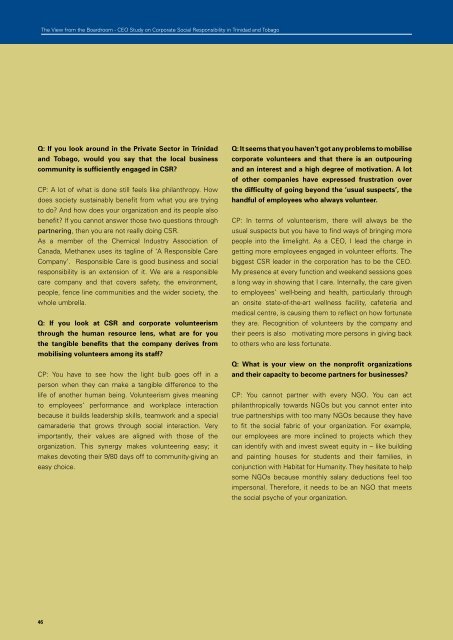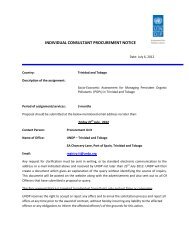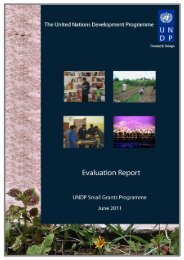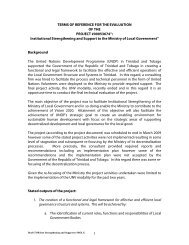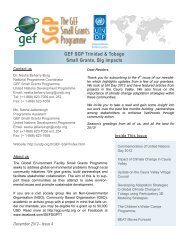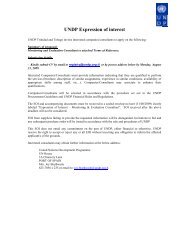The View from the Boardroom - UNDP Trinidad and Tobago
The View from the Boardroom - UNDP Trinidad and Tobago
The View from the Boardroom - UNDP Trinidad and Tobago
Create successful ePaper yourself
Turn your PDF publications into a flip-book with our unique Google optimized e-Paper software.
<strong>The</strong> <strong>View</strong> <strong>from</strong> <strong>the</strong> <strong>Boardroom</strong> - CEO Study on Corporate Social Responsibility in <strong>Trinidad</strong> <strong>and</strong> <strong>Tobago</strong>Q: If you look around in <strong>the</strong> Private Sector in <strong>Trinidad</strong><strong>and</strong> <strong>Tobago</strong>, would you say that <strong>the</strong> local businesscommunity is sufficiently engaged in CSR?CP: A lot of what is done still feels like philanthropy. Howdoes society sustainably benefit <strong>from</strong> what you are tryingto do? And how does your organization <strong>and</strong> its people alsobenefit? If you cannot answer those two questions throughpartnering, <strong>the</strong>n you are not really doing CSR.As a member of <strong>the</strong> Chemical Industry Association ofCanada, Methanex uses its tagline of ‘A Responsible CareCompany’. Responsible Care is good business <strong>and</strong> socialresponsibility is an extension of it. We are a responsiblecare company <strong>and</strong> that covers safety, <strong>the</strong> environment,people, fence line communities <strong>and</strong> <strong>the</strong> wider society, <strong>the</strong>whole umbrella.Q: If you look at CSR <strong>and</strong> corporate volunteerismthrough <strong>the</strong> human resource lens, what are for you<strong>the</strong> tangible benefits that <strong>the</strong> company derives <strong>from</strong>mobilising volunteers among its staff?CP: You have to see how <strong>the</strong> light bulb goes off in aperson when <strong>the</strong>y can make a tangible difference to <strong>the</strong>life of ano<strong>the</strong>r human being. Volunteerism gives meaningto employees’ performance <strong>and</strong> workplace interactionbecause it builds leadership skills, teamwork <strong>and</strong> a specialcamaraderie that grows through social interaction. Veryimportantly, <strong>the</strong>ir values are aligned with those of <strong>the</strong>organization. This synergy makes volunteering easy; itmakes devoting <strong>the</strong>ir 9/80 days off to community-giving aneasy choice.Q: It seems that you haven’t got any problems to mobilisecorporate volunteers <strong>and</strong> that <strong>the</strong>re is an outpouring<strong>and</strong> an interest <strong>and</strong> a high degree of motivation. A lotof o<strong>the</strong>r companies have expressed frustration over<strong>the</strong> difficulty of going beyond <strong>the</strong> ‘usual suspects’, <strong>the</strong>h<strong>and</strong>ful of employees who always volunteer.CP: In terms of volunteerism, <strong>the</strong>re will always be <strong>the</strong>usual suspects but you have to find ways of bringing morepeople into <strong>the</strong> limelight. As a CEO, I lead <strong>the</strong> charge ingetting more employees engaged in volunteer efforts. <strong>The</strong>biggest CSR leader in <strong>the</strong> corporation has to be <strong>the</strong> CEO.My presence at every function <strong>and</strong> weekend sessions goesa long way in showing that I care. Internally, <strong>the</strong> care givento employees’ well-being <strong>and</strong> health, particularly throughan onsite state-of-<strong>the</strong>-art wellness facility, cafeteria <strong>and</strong>medical centre, is causing <strong>the</strong>m to reflect on how fortunate<strong>the</strong>y are. Recognition of volunteers by <strong>the</strong> company <strong>and</strong><strong>the</strong>ir peers is also motivating more persons in giving backto o<strong>the</strong>rs who are less fortunate.Q: What is your view on <strong>the</strong> nonprofit organizations<strong>and</strong> <strong>the</strong>ir capacity to become partners for businesses?CP: You cannot partner with every NGO. You can actphilanthropically towards NGOs but you cannot enter intotrue partnerships with too many NGOs because <strong>the</strong>y haveto fit <strong>the</strong> social fabric of your organization. For example,our employees are more inclined to projects which <strong>the</strong>ycan identify with <strong>and</strong> invest sweat equity in – like building<strong>and</strong> painting houses for students <strong>and</strong> <strong>the</strong>ir families, inconjunction with Habitat for Humanity. <strong>The</strong>y hesitate to helpsome NGOs because monthly salary deductions feel tooimpersonal. <strong>The</strong>refore, it needs to be an NGO that meets<strong>the</strong> social psyche of your organization.46


